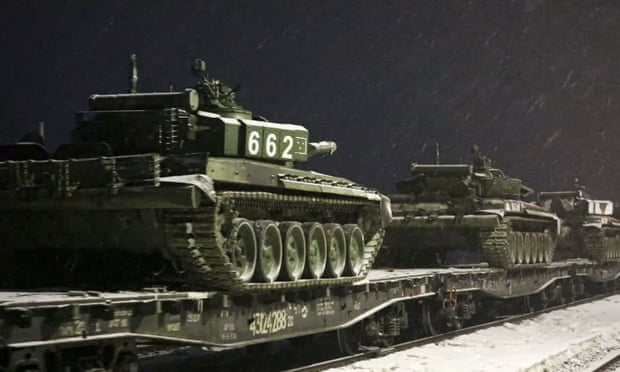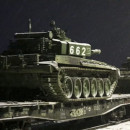 |
|---|
| Contrary to Vladimir Putin's claims that Russian forces are being withdrawn from the border with Ukraine, additional troops are arriving there, US secretary of state Anthony Blinken said. |
 
|
Russia Has Amassed up to 190,000 Troops on Ukraine Borders
The Guardian
Sat February 19, 2022
Russia has amassed up to 190,000 troops on the borders with Ukraine, the US warned on Friday, claiming it was “the biggest mobilisation of troops since the second world war” and an increase of more than 90,000 in less than a month.
The estimate including Russian-backed troops inside Ukraine only added to a growing sense of foreboding among western diplomats, as they gathered for a major security conference in Munich, that their efforts to avert war in Europe were doomed and that Vladimir Putin had irrevocably chosen the path of conflict.
News that the Russian-supporting republics of Donetsk and Luhansk had announced a mass evacuation of the region’s residents to Russia and reports of a car bomb in Donetsk close to the separatists’ headquarters added to fears of an impending assault as the US secretary of state, Antony Blinken, warned of a strategy of “creating false provocations”.
In Moscow, it was announced that Putin would this weekend oversee a drill of nuclear-capable ballistic and cruise missiles.
“This is one of the most dangerous moments where provocation and disinformation might turn into escalation,” said German foreign minister, Annalena Baerbock. “What is at stake for the people of Ukraine is their right to determine their own future, and, for all of us, what is at stake is nothing less than peace in Europe and whether we are going to defend our rules-based order, even if it comes to a crunch.”
She also warned the scale of violence had dramatically increased in the past 48 hours. The conflict was not a Ukraine crisis, she said, but “a Russia crisis … Those who want to live together in safety do not threaten each other.” Baerbock said she feared Russia would operate through a false flag operation or a coup rather than invasion.
Speaking alongside Blinken, Baerbock vowed that Germany was “willing to pay a high price in economic terms” through sanctions, adding that everything was on the table, including the Nord Stream 2 gas pipeline.
EU foreign ministers will look at their expected sanctions package on Monday, but western officials said it may be necessary to hit Russia “quickly and at scale” in the event of a non-conventional attack on Ukraine. Sanctions could be implemented “where we judge that Russia has crossed a line on this”, the officials said.
The warnings came as the US president Joe Biden prepared to hold further talks with European leaders by phone with the discussion as much now focused on how to respond to, rather than deter, an attack. Foreign ministers in Munich are likely to look at the threat of a major humanitarian crisis developing if refugees flee through Poland.
The US is nevertheless still hoping that the Russian foreign minister Sergei Lavrov will hold talks on Russia and Nato’s rival schemes for a future security map of Europe at the end of next week, possibly in Geneva.
Blinken warned that everything he was seeing suggested Russia had decided not to embark on the path of diplomacy and he feared the developments of the last 48 hours were likely part of a Russian plan to create false provocations.
He said he remained fully engaged with diplomacy, but the west had to be informed by history, including the Russian invasions of Ukraine in 2014 and Georgia in 2008. “We have to be informed by the facts, and the facts are that despite what Russia has said in recent days about pulling back troops from the border, [that] has not happened. On the contrary, we see additional forces going to the border, including leading-edge forces that will be part of any aggression,” he said.
The French president, Emmanuel Macron, called for an end to the shelling on the frontline in eastern Ukraine. “I welcome what President Putin has said, but I believe that if you want to be a reliable partner, then deeds should be in line with declarations, and I would like to see specific actions. As regards to pressure, military pressure, from Russia, destabilising acts, the increasing amount of shelling in the contact zone, firstly, we call for a ceasefire on such military actions, resume dialogue, because we continue to believe that dialogue is the way to move this situation forward.”
The tense mood at the conference was underscored when Baerbock was directly challenged by the mayor of Kyiv, Vitali Klitschko, over Germany’s provision of just 5,000 helmets to Ukraine. But Baerbock stood her ground about Germany’s refusal to supply weapons to Ukraine, saying now was not the moment for a 180-degree turn on Germany’s historic position on not selling arms into conflict zones.
She said different countries had different contributions, and Germany was doing more than any other country economically to help Ukraine, adding: “We all have different roles and different history.” But she revealed that Germany was looking at a fresh Ukrainian request for military help.
The UN secretary general, António Guterres, accused of being a powerless bystander in the conflict, warned that the threat to global security was now greater than during the cold war. He called on all parties to be extremely careful with their rhetoric. “Public statements should aim to reduce tensions, not fuel them,” he said.
“I still think it won’t happen. But, if it did, it would be catastrophic,” Guterres warned of the risk of an incalculable escalation. “This can also be triggered by communication breakdowns and false assumptions. During the cold war, there were also risk assessment mechanisms and informal ways of prevention. Today, most of these systems no longer exist and the people who used them are no longer there.”


 Share your thoughts in the Forum
Share your thoughts in the Forum
